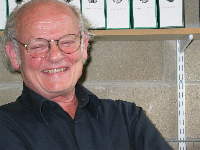Tiempo Climate Cyberlibrary
Interview with Peter Read
- Tiempo archive
- Complete issues
- Selected articles
- Cartoons
- Climate treaty
- Latest news
- Secretariat
- National reports
- IPCC
About the Cyberlibrary
The Tiempo Climate Cyberlibrary was developed by Mick Kelly and Sarah Granich on behalf of the Stockholm Environment Institute and the International Institute for Environment and Development, with sponsorship from the Swedish International Development Cooperation Agency.
While every effort is made to ensure that information on this site, and on other sites that are referenced here, is accurate, no liability for loss or damage resulting from use of this information can be accepted.
 |
Peter Read discusses the potential of bioenergy and the broader role of the biosphere in controlling the composition of the atmosphere. He also comments on George Monbiot's critique of biomass as a fuel source. |
|
Find out about Peter Read's global warming priority (low or high bandwidth streaming video) |
|
To listen to the streaming audio or video files, you will need RealPlayer or Real Alternative, both free downloads |
|
|
Streaming audio |
|
|
What is the potential of bioenergy? |
|
|
You're advocating a holistic approach to the carbon cycle in responding to global warming. Just what do you mean by a holistic response? |
|
|
Can you give an example of this approach? |
|
|
Is this an approach the Intergovernmental Panel on Climatic Change, the IPCC, with its rather technocentric approach to the climate problem, would advocate? |
|
|
Are there any potential drawbacks to the widespread use of bioenergy? |
|
|
The commentator George Monbiot has described the adoption of biofuels as a humanitarian disaster, committing land to energy rather than food production. What do you think of his critique? |
|
|
Should governments in the North be adopting this approach? |
|
|
And what of the South? |
|
|
On the Web |
|
In the Policy Debate on Global Biofuels Development, various authors debate George Monbiot's controversial view that the adoption of biofuels would be a humanitarian and environmental disaster (0.5Mb download). |
|
Biography |
|
Peter Read is a Senior Lecturer in the Department of Applied and International Economics at Massey University in New Zealand. He was awarded a PhD in Engineering at Cambridge University and worked in Whitehall on energy policy, before emigrating to New Zealand in 1980. He is author of "Responding to Global Warming", published by Zed Books. |
|
Contact information |
|
Peter Read, Department of Applied and International Economics, Massey University, Private Bag 11 222, Palmerston North, New Zealand. Fax: +64-6-3505660. Email: p.read@massey.ac.nz. Web: econ.massey.ac.nz. |
Bright Ideas

General Electric plans to cut solar installation costs by half

Project 90 by 2030 supports South African school children and managers reduce their carbon footprint through its Club programme

Bath & North East Somerset Council in the United Kingdom has installed smart LED carriageway lighting that automatically adjusts to light and traffic levels

The United States National Oceanic and Atmospheric Administration and the American Public Gardens Association are mounting an educational exhibit at Longwood Gardens showing the link between temperature and planting zones

The energy-efficient Crowne Plaza Copenhagen Towers hotel is powered by renewable and sustainable sources, including integrated solar photovoltaics and guest-powered bicycles
El Hierro, one of the Canary Islands, plans to generate 80 per cent of its energy from renewable sources

The green roof on the Remarkables Primary School in New Zealand reduces stormwater runoff, provides insulation and doubles as an outdoor classroom

The Weather Info for All project aims to roll out up to five thousand automatic weather observation stations throughout Africa

SolSource turns its own waste heat into electricity or stores it in thermal fabrics, harnessing the sun's energy for cooking and electricity for low-income families

The Wave House uses vegetation for its architectural and environmental qualities, and especially in terms of thermal insulation

The Mbale compost-processing plant in Uganda produces cheaper fertilizer and reduces greenhouse gas emissions

At Casa Grande, Frito-Lay has reduced energy consumption by nearly a fifth since 2006 by, amongst other things, installing a heat recovery system to preheat cooking oil
Updated: May 15th 2015